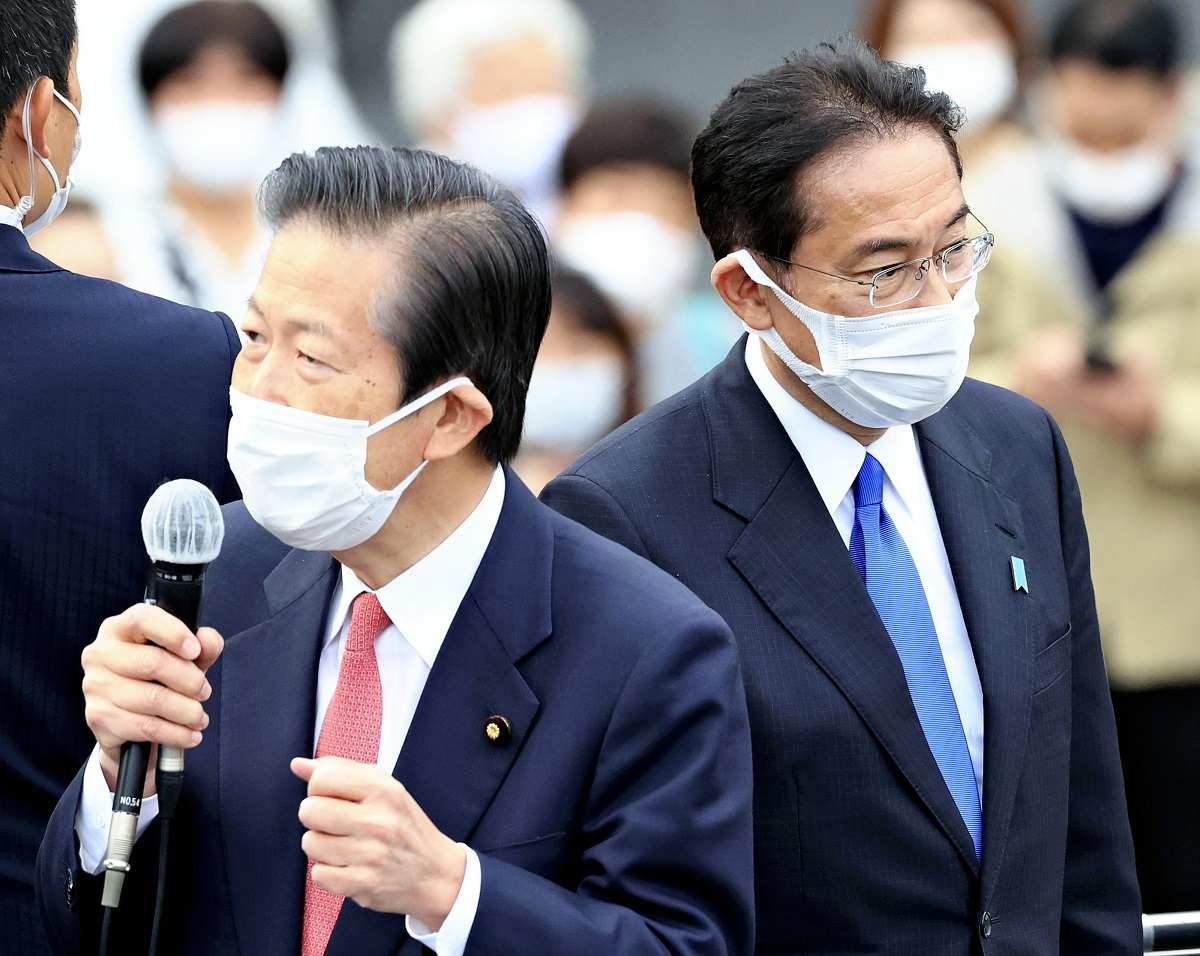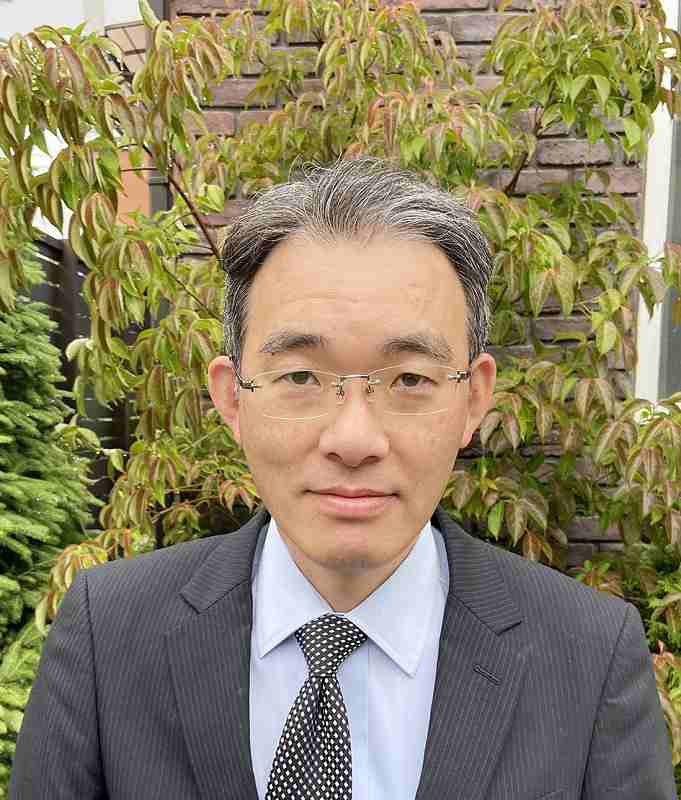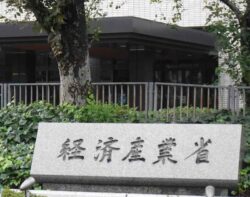
LDP President Fumio Kishida, right, listens to a stump speech by Komeito Chief Representative Natsuo Yamaguchi during the most recent House of Representatives election campaign in Sakai, Osaka, on Oct. 24, 2021.
8:00 JST, June 17, 2023
According to a famous Japanese proverb, “Even a dog won’t get involved in a couple’s quarrels.” The implied lesson is not to take such spats seriously because couples may quarrel often but make up soon.
Yet sometimes the rift is serious. That seems to be the case in the current quarrel between the Liberal Democratic Party and Komeito, which have been partners in Japan’s ruling coalition for two decades. If they don’t make up in time for the next House of Representatives election, both will suffer. And that outcome would only deepen their mutual distrust.
The origin of the rift was a misunderstanding between the two parties over selecting a candidate for Tokyo Constituency No. 28, in the eastern part of Nerima Ward. This is a new constituency that was created through electoral redistricting. Komeito, which holds only one Tokyo constituency seat in the lower house, strongly held the view that they should try for a second seat by fielding a candidate in the new constituency, especially as the LDP had not named a candidate of its own. But the LDP argued that its Federation of Tokyo Metropolitan LDP Branches had privately decided on a candidate, and rebuffed Komeito’s request.
Komeito was furious. Secretary General Keiichi Ishii told the press, “The relationship of trust between the LDP and Komeito in Tokyo has fallen to the ground.” In fact, Komeito decided not to endorse any LDP candidates in Tokyo. As Komeito has an average of roughly 20,000 votes in each constituency, this decision may cause the LDP a loss of several Tokyo seats.
There is suspicion within the LDP that Komeito might consider backdoor negotiations with Nippon Ishin (Japan Innovation Party) regarding a total of six lower house constituencies for which Komeito currently holds seats in Osaka and Hyogo prefectures. Ishin has not fielded its own candidates in those constituencies, but it is now discussing the possibility of doing so in the next lower house election.
The LDP’s suspicion is this: By not endorsing LDP candidates in Tokyo, Komeito is sending a message that if Ishin refrains from fielding candidates in the six Komeito-held constituencies in the Kansai area, some Komeito supporters would vote for Ishin’s candidates in Tokyo. One LDP executive recalled that Komeito seemed just as likely to break off negotiations on Tokyo Constituency No. 28 as to make a deal with the LDP.
In the unified local elections held in April, Ishin increased the number of seats it holds in local assemblies by about 60%. Osaka Gov. and Ishin coleader Hirofumi Yoshimura told the media, “Ishin has taken a big step toward being a national party.” Ishin announced that they will field candidates in all 30 Tokyo constituencies in the next lower house election.
In contrast, Komeito took a drubbing in the unified local elections. Twelve Komeito candidates lost their seats in the worst result since 1998. Komeito’s vote tally has been decreasing in general elections. They got 8,733,444 votes in the proportional representation vote in the 2003 lower house election, but in 2021 the number of votes went down to 7,114,282. But in the single-seat constituency vote, they got nine seats in both of those years.
So it is essential for Komeito to keep nine seats in the single-seat constituency vote in the next election. If Ishin fields candidates in all six of Komeito’s constituencies in Kansai, it would be quite difficult to meet the goal even if Komeito manages to win seats in two constituencies in Saitama and Aichi prefectures where the LDP does not plan to field candidates.
It seems to me that the rift is much deeper than one constituency or a single issue. Speaking anonymously, a senior LDP member said that the LDP’s top three leaders — Prime Minister and LDP President Fumio Kishida, Vice President Taro Aso and Secretary General Toshimitsu Motegi — don’t need Komeito’s endorsement to win in their constituencies, so they are tempted to hold an election without Komeito’s campaign cooperation. The three are said to have felt dissatisfaction over past LDP leaders such as former Prime Minister Yoshihide Suga and former Secretary General Toshihiro Nikai for having excessively temporized with Komeito. In short, they doubt the benefit of Komeito’s election campaign help — even while Komeito believes that a considerable number of LDP lower house members will lose their seats if Komeito’s supporters don’t vote for them.
Both parties’ approaches might lead them into a lose-lose situation in the next election and beyond.
The number of LDP seats may decrease. A senior Komeito member bluntly stated, “We will teach the LDP leaders our power in an election.” There are 57 current LDP members in the House of Representatives who won in the last general election in single-seat constituencies by a margin of under 20,000 votes — the average number of Komeito’s proportional votes in each constituency in nationwide.
If there is a complete break, the number of Komeito seats must decrease, too. In single-seat constituencies, Komeito candidates won’t win without gathering a high percentage of LDP supporters’ votes. In the proportional-representation vote, Komeito has gained some LDP supporters’ votes by asking LDP candidates in single-seat constituencies to urge their supporters to vote for Komeito in return for Komeito’s endorsement. However, Komeito won’t get enough LDP votes if LDP candidates and supporters feel uncomfortable with Komeito’s degree of cooperation with LDP candidates.
Will Komeito leave the ruling coalition? That is unlikely. Komeito derives benefits as a coalition partner, such as being able to shield Soka Gakkai, a lay Buddhist group linked to the party, from burdensome regulation. Leaving the ruling coalition could even put at risk Soka Gakkai’s privileges as a religious corporation, such as preferential tax treatment.
“The rift may not be resolved before the next lower house election,” a former cabinet member from Komeito admitted seriously, while anticipating that the relationship will be restored after the election. But the distrust may have a lasting effect if the result of the next election is harsh. An aide to the prime minister fears Komeito’s support for the administration would weaken, inflicting a huge negative impact on the Kishida administration.
Political Pulse appears every Saturday.

Satoshi Ogawa
Ogawa is the editor of the Political News Department of The Yomiuri Shimbun.
Top Articles in Editorial & Columns
-

Riku-Ryu Pair Wins Gold Medal: Their Strong Bond Leads to Major Comeback Victory
-

Reciprocal Tariffs Ruled Illegal: Judiciary Would Not Tolerate President’s High-Handed Approach
-

China Provoked Takaichi into Risky Move of Dissolving House of Representatives, But It’s a Gamble She Just Might Win
-

Flu Cases Surging Again: Infection Can Also Be Prevented by Humidifying Indoor Spaces
-

Japan’s Plan for Investment in U.S.: Aim for Mutual Development by Ensuring Profitability
JN ACCESS RANKING
-

Producer Behind Pop Group XG Arrested for Cocaine Possession
-

Japan PM Takaichi’s Cabinet Resigns en Masse
-

Man Infected with Measles Reportedly Dined at Restaurant in Tokyo Station
-

Israeli Ambassador to Japan Speaks about Japan’s Role in the Reconstruction of Gaza
-

Videos Plagiarized, Reposted with False Subtitles Claiming ‘Ryukyu Belongs to China’; Anti-China False Information Also Posted in Japan


























